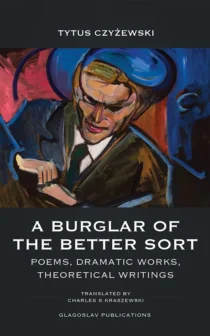Tytus Czyżewski
Tytus Czyżewski (1880–1945) was a multifaceted artistic talent, creative in drama, poetry, and painting. His sometimes belligerent critical manifestos — included in this translation — helped establish the foundations of contemporary art in the early decades of the twentieth century. As a painter (he studied for a while under the tutelage of another great Polish polymath, the painter and poet Stanisław Wyspiański), he was associated with Expressionism and Formism (of which he was the main motor, in both painting and poetry). After his studies at the Academy of Fine Arts in Kraków, he spent some five years in Paris, where he came under the influence Picasso, the Cubists, and Cézanne in painting, and Guillaume Apollinaire in poetry. His poetry and plays, all of which are contained in this volume, are refreshingly disengaged, politically and patriotically, which marks him as fresh voice in the literary tradition of his homeland, and arguably makes his stunningly creative output more accessible to readers beyond Poland’s borders. Chiefly concerned with form, he strove towards the “anarchisation” and autonomy of the word and the poetic phrase, admittedly following in the footsteps of Apollinaire and Marinetti, both of whom he held in high esteem. Both his literary works and his painting are imbued with a radical modernism, which yet acknowledges the folk traditions of southern Poland, where he was born and spent most of his life. In this respect, and others, Czyżewski had a significant impact on the future of Polish art, in particular, that of another giant of contemporary painting and theatre, Tadeusz Kantor.
Showing the single result
-
A Burglar of the Better Sort
Price range: €9.95 through €24.99 Select options This product has multiple variants. The options may be chosen on the product page

